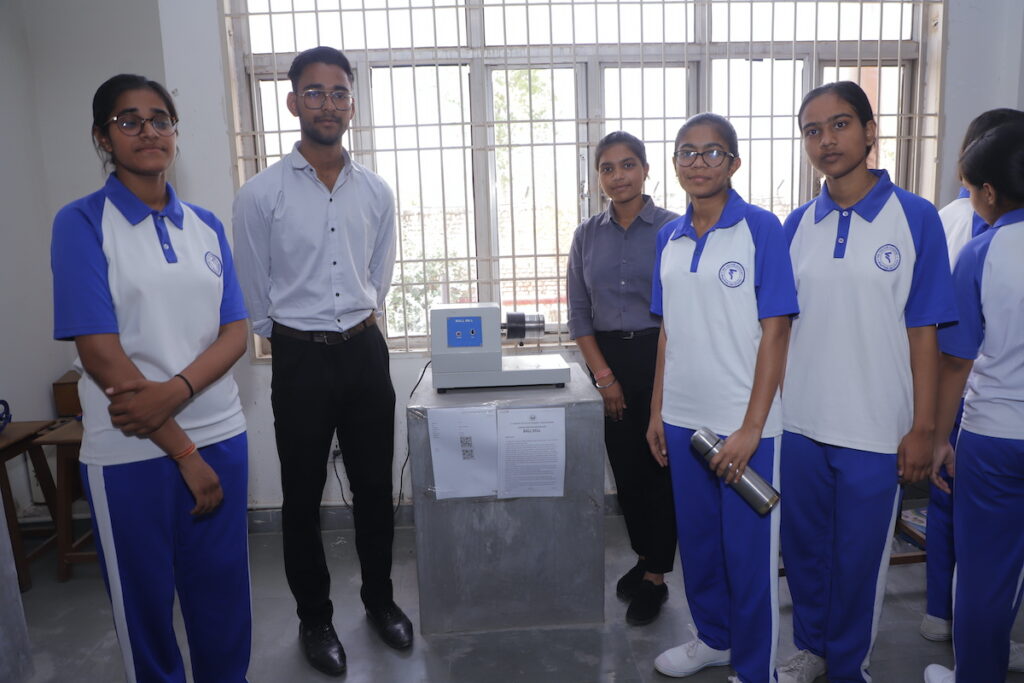D Pharma Course
The D Pharma course is a foundational program in the field of pharmaceutical science, designed to equip students with essential knowledge and practical skills required for a career in pharmacy.
Spanning two years and typically divided into four semesters, the course covers subjects like pharmacology, pharmaceutical chemistry, pharmacognosy, and hospital pharmacy.
Students also gain hands-on experience through internships in community pharmacies, hospitals, or pharmaceutical companies, where they learn about drug dispensing, patient counseling, and the basics of drug discovery and manufacturing.
Upon completion, graduates are eligible to register as pharmacists, allowing them to work in retail pharmacies, hospitals, or pursue further studies in pharmacy, such as B.Pharmacy or Pharm.D, for advanced career opportunities.
Some of the most opted courses in India and St. Andrews college or different Engineering college or Management colleges are as follows:-
- Btech
- Btech CSE
- Btech ETCE
- MTech
- BCA
- BBA
- MBA
- MCA
- DPharma – St. Andrews College of Pharmacy
- BPharma – St. Andrews College of Pharmacy
- BArch – St. Andrews College of Architecture
Eligibility Criteria and Admission Process for D Pharma

The eligibility criteria and admission process for a Diploma in Pharmacy (D.Pharma) program in India typically involve the following:
Eligibility Criteria:
Educational Qualification:
- Candidates must have completed their 10+2 or equivalent examination.
- The qualifying exam should have been passed with Physics, Chemistry, and Biology/Mathematics as the main subjects.
- Some institutions may also accept candidates who have completed vocational courses in pharmacy as part of their 10+2 education.
Minimum Marks:
- Candidates should have secured a minimum percentage of marks in the qualifying examination, usually ranging from 45% to 50%. However, the exact percentage may vary depending on the institution and the category of the candidate (e.g., general, SC/ST/OBC).
Age Limit:
- The minimum age limit for admission is generally 17 years as of the year of admission.
Admission Process:
Entrance Exam:
- Some institutions or states conduct entrance exams for admission into the D.Pharma course. For example, GPAT (Graduate Pharmacy Aptitude Test) is a national-level entrance exam, while some states may have their own exams.
- In other cases, admission might be based on the merit of the 10+2 examination without any entrance test.
Application Process:
- Candidates need to apply to the institutions offering the D.Pharma program. The application process may be online or offline, depending on the college.
- Applicants must fill out the application form, submit the required documents (such as mark sheets, identity proof, etc.), and pay the application fee.
Counseling:
- If admission is through an entrance exam, counseling sessions are usually conducted where candidates are allotted seats based on their ranks, preferences, and availability of seats.
- For merit-based admissions, a merit list is typically published, and candidates are called for counseling or direct admission.
Document Verification:
- During the counseling or admission process, candidates are required to undergo document verification to ensure the authenticity of their submitted credentials.
Final Admission:
- Once the verification is complete and the seat is allotted, candidates need to complete the admission formalities, which may include paying the tuition fees and submitting any additional required documents.
Commencement of Classes:
- After completing the admission process, classes for the D.Pharma program usually commence as per the academic calendar of the institution.
D Pharma Course Syllabus

The D Pharma Course is designed to offer a foundational understanding of pharmaceutical sciences across two years. Each year integrates a range of subjects that blend theoretical knowledge with practical experience.
Here is an overview of the syllabus:
First Year:
Pharmaceutics I: Introduction to different dosage forms, Metrology, Packaging of pharmaceuticals, Size reduction, size separation, and mixing, Extraction processes, Distillation, filtration, and drying, Sterilization and aseptic techniques, Immunity and vaccines
Pharmaceutical Chemistry I: Introduction to pharmaceutical chemistry, Sources of impurities and methods to determine the purity of pharmaceuticals, Volumetric analysis, Identification tests for ions and radicals, Limit tests, Acid-base titration, Redox titrations
Pharmacognosy: Introduction to pharmacognosy and its importance, Classification of drugs of natural origin, Cultivation, collection, and preparation of drugs, Detailed study of medicinal plants like Cinchona, Digitalis, Senna, etc., Introduction to secondary metabolites (alkaloids, glycosides, tannins, etc.), Systematic pharmacognostic study of certain crude drugs
Biochemistry and Clinical Pathology: Introduction to biochemistry, Carbohydrate metabolism, Lipids and proteins, Enzymes and their functions, Vitamins and minerals, Clinical pathology related to blood and urine analysis
Human Anatomy and Physiology: Introduction to human body structure, Detailed study of various systems (skeletal, muscular, cardiovascular, nervous, respiratory, digestive, excretory, reproductive), Fundamental concepts of homeostasis, Endocrine system and hormones
Health Education and Community Pharmacy: Concepts of health and disease, First aid and emergency treatment, Environmental hygiene, Communicable diseases and their prevention, Family planning and maternal health, Social pharmacy and its impact
Second Year:
Pharmaceutics II: Formulation and preparation of cosmetic preparations, Study of different types of tablets, capsules, syrups, and injections, Dispensing of prescription and calculation of doses, Introduction to surgical aids, Incompatibilities and incompatibility handling, Introduction to pharmaceutical jurisprudence
Pharmaceutical Chemistry II: Study of drugs, their chemical structure, and uses, Synthesis and medicinal uses of important pharmaceutical compounds, Study of pharmaceutical aids and necessities, Preparation and storage of radiopharmaceuticals
Pharmacology and Toxicology: Introduction to pharmacology, routes of drug administration, General mechanism of drug action and drug-receptor interaction, Pharmacology of drugs acting on the central nervous system, cardiovascular system, and endocrine system, Study of antibiotics, antifungal, and antiparasitic drugs, Introduction to toxicology, types of poisons, and antidotes
Pharmaceutical Jurisprudence: Introduction to pharmaceutical legislation in India, Pharmacy Act 1948 and Drug and Cosmetics Act 1940, Study of the Narcotic Drugs and Psychotropic Substances Act, Overview of the Drugs Price Control Order (DPCO), Introduction to pharmaceutical ethics
Drug Store and Business Management: Introduction to the management of drug stores, Inventory control, sales promotion, and accounting, Financial management and budgeting, Introduction to entrepreneurship and small-scale industry management
Hospital and Clinical Pharmacy: Role of hospital pharmacists, Study of hospital formulary and pharmacy services, Dispensing of prescriptions in hospitals, Introduction to clinical pharmacy and patient counseling, Therapeutic drug monitoring
Practical Training:
- Both years include practical sessions to provide hands-on experience in subjects like pharmaceutics, pharmaceutical chemistry, pharmacology, pharmacognosy, etc.
- Students are often required to undergo industrial training or internships in a hospital or pharmaceutical company as part of their course.
Diploma in Pharmacy Course Fees and Duration

Course Duration:
- Diploma in Pharmacy (D.Pharma) is a two-year full-time program.
- The course is divided into two academic years, with each year focusing on different subjects related to pharmaceutical sciences.
- After completing the academic years, some institutions may also require a practical training period (usually for 500 hours spread over 3 months) in a hospital or a pharmacy, which is necessary for registration as a pharmacist.
Course Fees:
- The fees for the D.Pharma course can vary significantly depending on the type of institution (government or private) and its location.
Government Colleges:
- Fees Range: Approximately ₹10,000 to ₹50,000 per year.
- Government colleges usually have lower fees due to state or central government subsidies.
Private Colleges:
- Fees Range: Approximately ₹50,000 to ₹1,50,000 per year.
- Fees in private institutions can be higher, reflecting the facilities and resources provided by the college.
Additional Costs:
- In addition to tuition fees, students may also be required to cover extra costs like exam fees, laboratory fees, library fees, and various other incidental expenses.
- Some institutions might also charge fees for uniforms, books, and study materials.
D. Pharma Career Scope and Job Opportunities

A Diploma in Pharmacy (D.Pharma) opens up various career opportunities in the pharmaceutical and healthcare sectors. The scope for D.Pharma graduates is broad, with opportunities in both private and public sectors. Here’s an overview of the career scope and job opportunities available:
Career Scope:
Pharmacy Practice:
- Retail Pharmacist: As a registered pharmacist, work in community pharmacies or retail drug stores, where you are responsible for dispensing medications, advising patients on their use, and ensuring compliance with legal and ethical guidelines.
- Hospital Pharmacist: With a registered pharmacy qualification, work in hospital pharmacies where your responsibilities include dispensing medications to inpatients and outpatients, preparing sterile products, and collaborating with healthcare professionals on patient care.
Pharmaceutical Industry:
- Production and Manufacturing: Involvement in the production and manufacturing processes of pharmaceutical products, including tablets, capsules, injections, and more.
- Quality Control/Assurance: Ensuring that pharmaceutical products meet the required quality standards and are safe for consumption. This role involves testing products at various stages of production.
- Sales and Marketing: Work as a medical representative or in pharmaceutical sales and marketing, promoting drugs and other pharmaceutical products to healthcare professionals.
Regulatory Affairs:
- In regulatory roles, professionals ensure that products comply with all regulations and guidelines set by governmental bodies. This includes working on drug approval processes and maintaining necessary documentation.
Research and Development:
- Although more common for graduates with advanced degrees, some D.Pharma holders may work as assistants or technicians in research labs, helping to develop new drugs and formulations.
Teaching and Education:
- With additional qualifications and experience, D.Pharma holders can also pursue teaching roles in pharmacy colleges as lab instructors or lecturers, or contribute their expertise to online pharmacy education programs.
Entrepreneurship:
- After gaining some experience, you can start your own pharmacy or wholesale drug distribution business. This requires registration with the Pharmacy Council and adherence to regulatory standards.
Job Opportunities:
Retail and Community Pharmacies:
- Opportunities in independent pharmacies, chain pharmacies, and drug stores.
- Popular roles include Pharmacist, Pharmacy Assistant, and Pharmacy Manager.
Hospitals and Clinics:
- Employment as a Hospital Pharmacist, where you work alongside doctors and nurses to manage and dispense medications for patients.
Pharmaceutical Companies:
- Roles in production, quality control, quality assurance, packaging, and labeling.
- Sales roles, such as Medical Representatives, where you promote pharmaceutical products to doctors and healthcare institutions.
Government Jobs:
- Employment in government hospitals, health departments, and public sector pharmaceutical companies.
- Regulatory roles in agencies like the Food and Drug Administration (FDA).
Healthcare Institutions:
- Work in nursing homes, rehabilitation centers, or large healthcare institutions where medication management is critical.
Research Laboratories:
- Roles as laboratory technicians or assistants in pharmaceutical research labs.
Further Education:
- After completing D.Pharma, many graduates opt to pursue higher education such as a Bachelor of Pharmacy (B.Pharm) or a Bachelor of Science in Pharmacy. This can open up more advanced career opportunities in the pharmaceutical field, including research, clinical trials, and higher administrative roles.
Salary Expectations:
- Entry-Level Pharma Salary: ₹2,00,000 to ₹3,00,000 per annum.
- Experienced Professionals: ₹4,00,000 to ₹6,00,000 per annum, with potential for higher earnings in specialized roles or with additional qualifications.
Global Opportunities:
- With experience and additional certifications, D.Pharma holders may also find opportunities abroad, particularly in countries with growing healthcare sectors.
Top Colleges for D. Pharmacy and Specializations

Here’s a list of some of the top colleges in India for pursuing a Diploma in Pharmacy (D.Pharma) along with potential specializations available at the diploma level.
Top Colleges for D. Pharmacy in India:
St. Andrews College of Pharmacy (SACP), Gurgaon
- Renowned for its pharmaceutical sciences programs, St. Andrews College of Pharmacy offers a strong curriculum and excellent placement opportunities.
Delhi Institute of Pharmaceutical Sciences and Research (DIPSAR), New Delhi
- A prestigious government institution that offers high-quality education in pharmaceutical sciences with strong industry ties.
Institute of Chemical Technology (ICT), Mumbai
- A premier institute offering advanced education in chemical and pharmaceutical sciences, with a focus on research and innovation.
Poona College of Pharmacy, Pune
- Affiliated with Bharati Vidyapeeth, this college is well-regarded for its pharmacy programs and offers excellent faculty and facilities.
L. M. College of Pharmacy, Ahmedabad
- One of the oldest pharmacy colleges in India, known for its rich history and commitment to high academic standards.
JSS College of Pharmacy, Ooty and Mysuru
- Part of JSS Academy of Higher Education & Research, this college offers comprehensive pharmacy programs with a focus on research and development.
Madras Medical College, Chennai
- Offers a well-established pharmacy program with excellent clinical exposure and internship opportunities.
Al-Ameen College of Pharmacy, Bangalore
- A reputed institution offering D.Pharma with modern facilities and a focus on industry-relevant education.
Maharashtra Institute of Pharmacy, Pune
- Known for its high academic standards and strong focus on practical training in pharmaceutical sciences.
Specializations in D. Pharmacy:
D.Pharma is generally a foundational course that covers a broad spectrum of pharmaceutical sciences. Unlike higher degrees like B.Pharma or M.Pharma, specializations at the diploma level are not as common.
However, students may find certain areas emphasized depending on the institution’s focus or through elective courses and practical training.
Some of these areas may include:
Community Pharmacy:
- Focuses on dispensing medications and advising patients in a retail or community pharmacy setting.
Hospital Pharmacy:
- Involves working in a hospital environment, managing inpatient and outpatient medication, and collaborating with healthcare professionals.
Pharmaceutical Marketing:
- Introduces students to the basics of pharmaceutical sales and marketing, which can be an elective or part of the curriculum in some institutions.
Quality Control/Assurance:
- Emphasizes ensuring the quality and safety of pharmaceutical products, which may be part of practical training in labs.
Pharmaceutical Production:
- Focuses on the manufacturing processes of pharmaceuticals, including the formulation, production, and packaging of drugs.
Further Specialization After D.Pharma:
While D.Pharma itself does not offer advanced specializations, students who wish to specialize further often pursue a Bachelor of Pharmacy (B.Pharma), followed by a Master of Pharmacy (M.Pharma), where they can choose specific areas such as:
- Pharmaceutics
- Pharmacology
- Pharmaceutical Chemistry
- Pharmacognosy
- Pharmaceutical Biotechnology
- Clinical Pharmacy
Benefits of Pursuing D Pharma Course

Pursuing a Diploma in Pharmacy (D.Pharma) offers several benefits, particularly for those interested in the pharmaceutical and healthcare sectors.
Here are some of the key advantages:
Quick Entry into the Pharmaceutical Industry:
Short Duration: The D.Pharma course is a two-year program, making it one of the quickest ways to enter the pharmaceutical field. This allows students to start their careers earlier compared to other longer-duration programs.
Immediate Employment Opportunities: Graduates can quickly find employment as pharmacists, pharmacy technicians, or assistants in various settings such as retail pharmacies, hospitals, and pharmaceutical companies.
Diverse Career Opportunities:
Pharmacy Practice: D.Pharma graduates can work in community pharmacies, hospital pharmacies, and clinical settings, providing essential healthcare services.
Pharmaceutical Industry Roles: Opportunities are available in drug manufacturing, quality control, packaging, and sales, among others.
Entrepreneurial Path: Graduates can start their own pharmacy business, which can be a lucrative and rewarding career path.
Foundation for Further Education:
Stepping Stone to Higher Studies: D.Pharma serves as a foundation for pursuing advanced degrees such as Bachelor of Pharmacy (B.Pharma), Master of Pharmacy (M.Pharma), or even a Doctor of Pharmacy (Pharm.D). This can lead to specialized and higher-paying roles in the pharmaceutical industry.
Specialization Opportunities: With further education, students can specialize in areas like pharmacology, pharmaceutics, clinical pharmacy, or pharmaceutical chemistry.
High Demand and Job Stability:
Evergreen Sector: The pharmaceutical and healthcare sectors are critical industries that are always in demand. With the growing healthcare needs globally, pharmacists and pharmacy technicians are essential.
Job Security: The healthcare field offers job stability and security, as the demand for medications and healthcare services is constant and even growing, particularly in light of global health challenges.
Contribution to Society:
Healthcare Provider: As a pharmacist or pharmacy assistant, you play a crucial role in healthcare by ensuring that patients receive the correct medications and understanding their proper use, thus contributing to the well-being of the community.
Public Health Role: Pharmacists are also involved in public health initiatives, vaccination drives, and patient education, which have a significant positive impact on society.
Flexibility in Work Environment:
Varied Work Settings: D.Pharma graduates can choose to work in different environments such as hospitals, community pharmacies, pharmaceutical companies, research labs, or even educational institutions.
Flexible Work Hours: Many pharmacy roles, especially in retail settings, offer flexible working hours, which can be beneficial for maintaining a work-life balance.
Competitive Salary:
Decent Starting Salary: D.Pharma graduates typically enjoy a competitive starting salary, which can increase with experience and further education.
Potential for Growth: With additional certifications, experience, and education, there is significant potential for salary growth and advancement into higher roles within the industry.
Regulatory and Legal Expertise:
Understanding of Regulations: The D.Pharma curriculum includes pharmaceutical jurisprudence, which provides knowledge of the laws and regulations governing the pharmaceutical industry. This knowledge is crucial for those interested in regulatory affairs or compliance roles.
Opportunity for Global Careers:
International Opportunities: With the growing global healthcare market, D.Pharma graduates can find opportunities abroad, particularly in countries with expanding healthcare sectors. Additional certifications or qualifications may be required depending on the country.
Foundation for Entrepreneurship:
Starting Your Own Business: The D.Pharma course provides the necessary knowledge and skills to start and manage your own pharmacy or wholesale drug distribution business. This entrepreneurial path can be both financially rewarding and personally fulfilling.
Continuous Learning and Development:
Lifelong Learning: The field of pharmacy is continuously evolving with new drugs, therapies, and technologies. This offers D.Pharma graduates opportunities for continuous learning and professional development throughout their careers.
Comparison with B Pharma

When deciding between pursuing a Diploma in Pharmacy (D.Pharma) and a Bachelor of Pharmacy (B.Pharma), it’s essential to consider various factors, including the duration of the courses, the depth of study, career opportunities, and long-term goals.
Here’s a comprehensive comparison between the two:
Duration:
- D.Pharma:
- Duration: 2 years
- Additional Training: Some institutions require practical training for a few months after the course.
- B.Pharma:
- Duration: 4 years
- Structure: Divided into 8 semesters, covering a more in-depth study of pharmaceutical sciences.
Eligibility Criteria:
- D.Pharma:
- Eligibility: Completion of 10+2 (or equivalent) with Physics, Chemistry, and Biology/Mathematics.
- B.Pharma:
- Eligibility: Completion of 10+2 (or equivalent) with Physics, Chemistry, Biology/Mathematics, and English. Some universities may require a minimum percentage of marks, and entrance exams may also be required.
Curriculum and Scope of Study:
- D.Pharma:
- Focus: Provides basic foundational knowledge in pharmacy, covering subjects like pharmaceutics, pharmacology, pharmacognosy, and pharmaceutical chemistry.
- Scope: Primarily designed for entry-level roles in pharmacy practice, including community and hospital pharmacy.
- B.Pharma:
- Focus: Offers a more comprehensive and in-depth study of pharmaceutical sciences, including advanced topics such as pharmaceutical analysis, medicinal chemistry, biochemistry, biotechnology, and clinical pharmacy.
- Scope: Designed for a broader range of career opportunities, including research and development, quality control, regulatory affairs, clinical trials, and academia.
Career Opportunities:
- D.Pharma:
- Entry-Level Roles: Graduates can work as pharmacists in retail pharmacies, hospital pharmacies, and as pharmacy assistants or technicians.
- Limited Advancement: While D.Pharma graduates can pursue roles in the pharmaceutical industry, their career progression may be limited without further education.
- B.Pharma:
- Diverse Roles: Graduates can work in various sectors, including pharmaceutical companies, research labs, quality control, clinical trials, regulatory affairs, marketing, and academia.
- Advancement Opportunities: B.Pharma graduates have better opportunities for career advancement, particularly if they pursue higher education (e.g., M.Pharma, Pharm.D, or MBA).
Further Education and Specialization:
- D.Pharma:
- Further Studies: Graduates can pursue a B.Pharma through lateral entry, typically entering directly into the second year of the B.Pharma program.
- Limited Specialization: D.Pharma does not offer much scope for specialization, which is more accessible at the bachelor’s or master
Required Skills and Knowledge for Diploma in Pharmacy

Pursuing a Diploma in Pharmacy (D.Pharma) requires a specific set of skills and knowledge to ensure success in both the academic program and subsequent professional practice.
Here are the essential skills and knowledge areas needed:
Strong Foundation in Science:
- Chemistry: A solid understanding of chemical principles, especially organic and inorganic chemistry, is crucial for understanding drug composition, reactions, and interactions.
- Biology: Knowledge of human anatomy, physiology, and microbiology is essential to comprehend how drugs affect the body and to understand the biological basis of diseases.
- Physics: Basic knowledge of physics, particularly in areas related to metrology (measurement) and the physical properties of substances, is important in pharmaceutical formulations.
Attention to Detail:
- Precision: Accuracy in measuring, mixing, and compounding medications is critical to ensuring patient safety.
- Observation: Careful attention to detail is required when reading prescriptions, preparing medications, and identifying potential drug interactions or contraindications.
Analytical and Problem-Solving Skills:
- Critical Thinking: Ability to analyze patient needs, assess potential issues with prescriptions, and find solutions to complex problems is essential in a pharmacy setting.
- Data Interpretation: Understanding and interpreting data from lab tests, clinical trials, or patient histories is important for making informed decisions.
Communication Skills:
- Verbal Communication: Pharmacists need to communicate effectively with patients, explaining how to take medications, potential side effects, and other essential information.
- Written Communication: Clear and accurate documentation of patient records, prescriptions, and reports is vital.
Ethical and Legal Knowledge:
- Pharmaceutical Jurisprudence: Understanding the laws and regulations governing the practice of pharmacy, including drug laws, ethics, and professional conduct, is necessary to ensure compliance and maintain public trust.
- Confidentiality: Pharmacists must uphold patient confidentiality and handle sensitive information with discretion.
Technical Skills:
- Pharmacy Software: Familiarity with pharmacy management software for managing prescriptions, inventory, and patient records is increasingly important.
- Lab Techniques: Proficiency in basic laboratory techniques and equipment used in compounding and quality control.
Customer Service Orientation:
- Patient Care: A patient-centered approach, with a focus on providing excellent service and care, is essential in both retail and hospital pharmacy settings.
- Empathy: The ability to empathize with patients and understand their concerns contributes to better patient interactions and outcomes.
Time Management and Organizational Skills:
- Multitasking: Pharmacists often handle multiple tasks simultaneously, such as filling prescriptions, counseling patients, and managing inventory, making time management a critical skill.
- Organization: Keeping accurate records, maintaining an orderly work environment, and managing inventory efficiently are all part of a pharmacist’s daily responsibilities.
Knowledge of Drug and Therapeutic Agents:
- Pharmacology: Understanding the mechanisms of action, therapeutic uses, side effects, and interactions of various drugs is a core aspect of the D.Pharma curriculum.
- Pharmaceutics: Knowledge of drug formulation, delivery systems, and the principles of preparing different dosage forms (e.g., tablets, capsules, injections) is essential.
Lifelong Learning and Adaptability:
- Continuous Education: The pharmaceutical field is constantly evolving with new drugs, technologies, and regulations. A commitment to lifelong learning through continuing education and professional development is important.
- Adaptability: The ability to adapt to new challenges, technologies, and practices in the ever-changing healthcare environment.
Interpersonal Skills:
- Teamwork: Collaborating effectively with other healthcare professionals, such as doctors, nurses, and lab technicians, is often required.
- Conflict Resolution: Being able to handle conflicts or difficult situations with patients or colleagues in a professional manner.
Basic Business Skills (for Entrepreneurs):
- Inventory Management: Understanding how to manage drug inventory efficiently to minimize waste and ensure availability.
- Financial Management: Basic knowledge of business operations, budgeting, and financial management is beneficial, especially for those interested in opening their own pharmacy.
Understanding Public Health Issues:
- Health Education: Pharmacists often play a role in educating the public about health issues, including the proper use of medications, preventive measures, and lifestyle modifications.
- Community Awareness: Awareness of local health challenges and demographics can help pharmacists better serve their communities.
FAQs
What is a D Pharma course?
A D Pharma course is a two-year undergraduate program that provides foundational knowledge in pharmaceutical sciences, preparing students for entry-level roles in the pharmacy sector. It covers subjects like pharmacology, chemistry, and pharmacy practices, enabling graduates to work as licensed pharmacists or pursue further studies.
Which is better, D-Pharm or B-Pharm?
Choosing between D.Pharm (Diploma in Pharmacy) and B.Pharm (Bachelor of Pharmacy) depends on career goals. D.Pharm is a two-year course offering basic knowledge, suitable for entry-level positions like pharmacy technicians. B.Pharm is a four-year degree providing in-depth understanding of pharmaceutical sciences, opening doors to roles in research, clinical practice, and higher studies. For broader opportunities and advancement, B.Pharm is generally preferred.
Can I do D-Pharm after 12th?
Yes, you can pursue a D.Pharm (Diploma in Pharmacy) course after completing 12th grade. The eligibility criteria typically require students to have completed 12th with a science stream, specifically with subjects like Physics, Chemistry, and either Biology or Mathematics. D.Pharm is a two-year program that provides foundational knowledge in pharmacy, leading to careers in the pharmaceutical field.
Is D Pharma equal to doctor?
No, a D.Pharm (Diploma in Pharmacy) is not equivalent to being a doctor. D.Pharm graduates are trained as pharmacists, focusing on the preparation, dispensing, and proper use of medications. They are qualified to work in pharmacies, hospitals, or pharmaceutical companies. In contrast, doctors undergo extensive medical education (such as an MBBS degree) to diagnose and treat illnesses. While both play crucial roles in healthcare, their responsibilities and qualifications are different.




